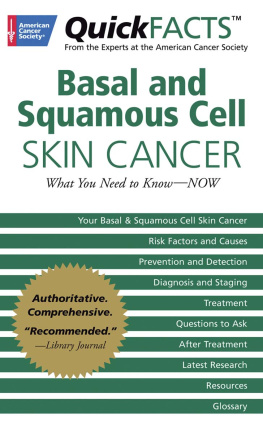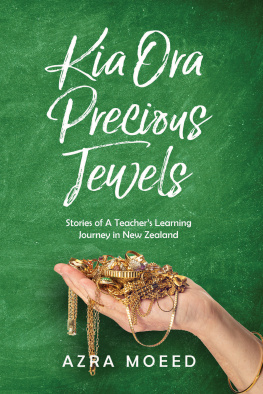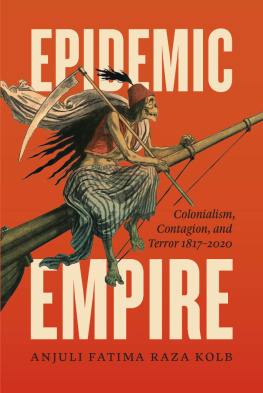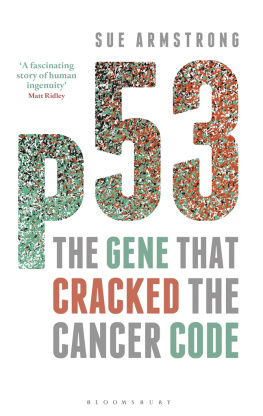Azra Raza - The First Cell: And the Human Costs of Pursuing Cancer to the Last
Here you can read online Azra Raza - The First Cell: And the Human Costs of Pursuing Cancer to the Last full text of the book (entire story) in english for free. Download pdf and epub, get meaning, cover and reviews about this ebook. year: 2019, publisher: Basic Books, genre: Home and family. Description of the work, (preface) as well as reviews are available. Best literature library LitArk.com created for fans of good reading and offers a wide selection of genres:
Romance novel
Science fiction
Adventure
Detective
Science
History
Home and family
Prose
Art
Politics
Computer
Non-fiction
Religion
Business
Children
Humor
Choose a favorite category and find really read worthwhile books. Enjoy immersion in the world of imagination, feel the emotions of the characters or learn something new for yourself, make an fascinating discovery.

- Book:The First Cell: And the Human Costs of Pursuing Cancer to the Last
- Author:
- Publisher:Basic Books
- Genre:
- Year:2019
- Rating:5 / 5
- Favourites:Add to favourites
- Your mark:
- 100
- 1
- 2
- 3
- 4
- 5
The First Cell: And the Human Costs of Pursuing Cancer to the Last: summary, description and annotation
We offer to read an annotation, description, summary or preface (depends on what the author of the book "The First Cell: And the Human Costs of Pursuing Cancer to the Last" wrote himself). If you haven't found the necessary information about the book — write in the comments, we will try to find it.
The First Cell: And the Human Costs of Pursuing Cancer to the Last — read online for free the complete book (whole text) full work
Below is the text of the book, divided by pages. System saving the place of the last page read, allows you to conveniently read the book "The First Cell: And the Human Costs of Pursuing Cancer to the Last" online for free, without having to search again every time where you left off. Put a bookmark, and you can go to the page where you finished reading at any time.
Font size:
Interval:
Bookmark:
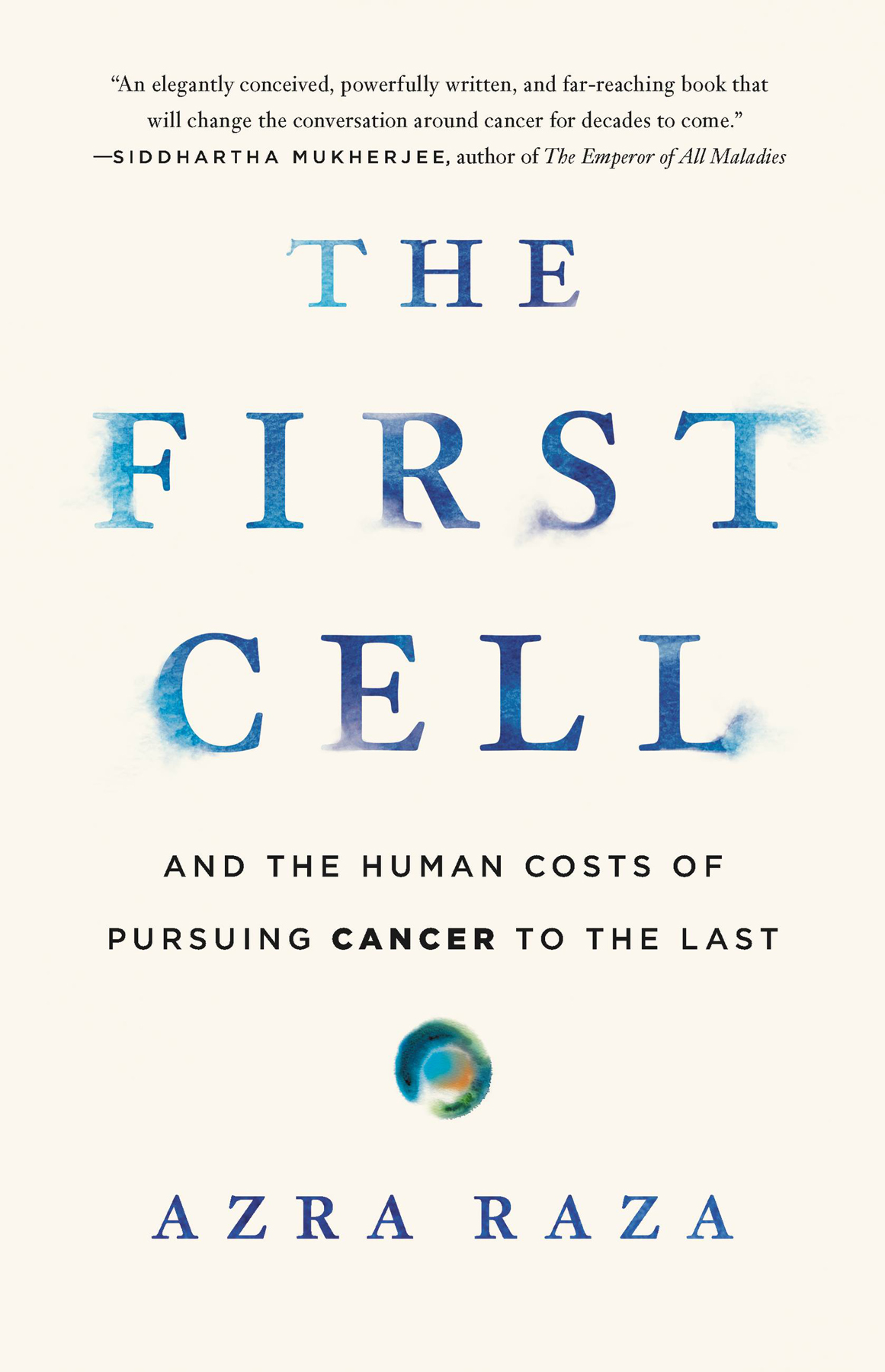
Copyright 2019 by Azra Raza
Cover design by Ann Kirchner
Cover image copyright Rudchenko Liliia/Shutterstock.com; copyright Hedzun Vasyl/Shutterstock.com
Cover copyright 2019 Hachette Book Group, Inc.
Hachette Book Group supports the right to free expression and the value of copyright. The purpose of copyright is to encourage writers and artists to produce the creative works that enrich our culture.
The scanning, uploading, and distribution of this book without permission is | a theft of the authors intellectual property. If you would like permission to use material from the book (other than for review purposes), please contact permissions@hbgusa.com. Thank you for your support of the authors rights.
Basic Books
Hachette Book Group
1290 Avenue of the Americas, New York, NY 10104
www.basicbooks.com
First Edition: October 2019
Published by Basic Books, an imprint of Perseus Books, LLC, a subsidiary of Hachette Book Group, Inc. The Basic Books name and logo is a trademark of the Hachette Book Group.
The Hachette Speakers Bureau provides a wide range of authors for speaking events. To find out more, go to www.hachettespeakersbureau.com or call (866) 376-6591.
The publisher is not responsible for websites (or their content) that are not owned by the publisher.
Additional copyright/credits information is .
The Library of Congress has cataloged the hardcover edition as follows:
Names: Raza, Azra, author.
Title: The first cell : and the human costs of pursuing cancer to the last / Azra Raza.
Description: New York : Basic Books, 2019 | Includes bibliographical references and index.
Identifiers: LCCN 2019016257 (print) | LCCN 2019018259 (ebook) | ISBN 9781541699502 (ebook) | ISBN 9781541699526 (hardcover)
Subjects: | MESH: Neoplasmstherapy | Medical Oncology | Neoplasmsprevention & control | Personal Narrative
Classification: LCC RC263 (ebook) | LCC RC263 (print) | NLM QZ 21 | DDC 616.99/4dc23
LC record available at https://lccn.loc.gov/2019016257
ISBNs: 978-1-5416-9952-6 (hardcover); 978-1-5416-9950-2 (ebook)
E3-20190830-JV-NF-ORI
Showing that compassion is just as important for cancer patients as the drugs administered to them, Razas deeply personal work brings understanding and empathy to the fore in a way that a purely scientific explication never could.
Publishers Weekly (Starred)
With elegant literary references and a compassion that deeply personalizes her interactions with patients and families, she engages readers in a commitment to finding a better way. Intelligence, empathy, and optimism inform the argument for new research on cancer that could obviate the suffering prevalent today.
Kirkus (Starred)
An affecting, fascinating, timely, and uncompromisingly honest look at where we stand in treating the most fearsome disease in most peoples worry list.
Steven Pinker, Johnstone Professor of Psychology at Harvard University and author of Enlightenment Now: The Case for Reason, Science, Humanism, and Progress
With wisdom distilled from more than three decades of clinical practice, the sensibilities of a poet, and a deep compassion for her fellow humans, Azra Raza provides a compelling argument that a key way forward in improving patient outcomes is early diagnosis and treatment, before cancer has become much too complex for any therapy to overcome.
David Steensma, attending physician at the Dana-Farber Cancer Institute and associate professor at Harvard Medical School
Unraveling myth and metaphor surrounding the disease with unrelenting acuity and sharing the pathos of lives that have been slashed of years and months and shorn of hope and promise by cancer, Dr. Raza reveals a world that has of yet been inaccessible to those who mourn humanitys lack of progress against the disease while being simultaneously baffled by it. Here is a masterful rendition of how an emphasis on curing cancer, instead of working to detect its first venomous breath, has exacted a terrible price in human lives, including that of her very own husband, Harvey. The First Cell is an intertwining of literature and life, science and cutting-edge cancer research, that demands a radical transformation in the way we humans understand the most tragic killer of our time. Through her poignant story-telling and the strength of a scientific vision built on decades of hard-wrought lessons gleaned from her work as a clinician and research scholar, Dr. Raza presents an arresting account that challenges our core understanding of cancer and cure.
Rafia Zakaria, author of The Upstairs Wife and Veil
As a cancer survivor, I can testify that Dr. Razas call to action for more research on early detection is vitally important. In a world driven by profit, this book is by a doctor who thinks about the patient first.
Ruchira Gupta, journalist and activist
To Sheherzad
Khurshid-e-Jahan Taab Ki Zau Tere Sharar Mein
Abad Hai Ek Taza Jahan Tere Hunar Mein
Allama Iqbal
The spark in you is a radiant sun
A new world lives in your talent
And to my siblings
Amera, Atiya, Tasnim, Javed, Sughra, and Abbas
In honor of what the G7 share: the deep love of each other and of Syed Ali Raza and Begum Zaheer Fatima, and memories of the best of times at Gulistan e Razathe secure, warm, and fun home in our beloved Karachi

Kaavish ka dil karay hay taqaaza kay hay hunoz Nakhun pe qarz uss girah e neem baaz ka
G HALIB
The heart demands greater exertion into inquiry, for yet Our fingernails owe a debt to the half-undone knots
The work of the eyes is done. Go now and do the heart-work on the images imprisoned within you.
R AINER M ARIA R ILKE
I N THE EARLY SPRING OF 1998, MY HUSBAND, H ARVEY P REISLER, was diagnosed with cancer. The following year, we planned to take our five-year-old daughter, Sheherzad, and my brother Javeds two children visiting from Pakistan, Musa and Batool, eight and twelve, to San Francisco for a highly anticipated vacation. We had already postponed the trip twice before, but it could be delayed no longer. The children were eager, and given Harveys disfiguring facial edema and the enlarging nodes, some form of aggressive treatmentsure to require us to stay put in the city for monthswas now imminent. Before any of that happened, he felt strongly that the family needed to get out of the sweltering heat of Chicago for a vacation, even if for just a week.
Our flight to San Francisco was on a bright, clear summer morning. Having arrived at the gate a good ninety minutes before our departure, we split up; Harvey sat down in the boarding area while I chased the children around OHare. We got something to eat at the food court and then returned to the gate.
I was shocked by what I saw. Harvey sat, looking dazed, as streams of sweat poured from his body, making little puddles under his elbows on the armrests of the chair and under his knees on the floor. He was beet red. Tributaries of glistening perspiration filled the lines in his handsome face, making it appear startlingly young. He looked at me with hushed anxiety. I sent Batool running for the nearest caf to get me a handful of napkins. I dabbed Harveys face and arms, wiping the chair and floor. There was no respite. The sweat came in torrential waves. His T-shirt and shorts were entirely soaked and dripping. The children stood around trying not to look, their faces ashen. It was a good fifteen minutes before the deluge subsided. I walked to the gift shop and purchased a fresh pair of pants and shirt. Without saying a word, little eight-year-old Musa stepped forward, quietly took the package from me, and gently escorted a bewildered Harvey to the restroom.
Font size:
Interval:
Bookmark:
Similar books «The First Cell: And the Human Costs of Pursuing Cancer to the Last»
Look at similar books to The First Cell: And the Human Costs of Pursuing Cancer to the Last. We have selected literature similar in name and meaning in the hope of providing readers with more options to find new, interesting, not yet read works.
Discussion, reviews of the book The First Cell: And the Human Costs of Pursuing Cancer to the Last and just readers' own opinions. Leave your comments, write what you think about the work, its meaning or the main characters. Specify what exactly you liked and what you didn't like, and why you think so.

